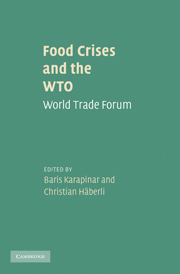1 - Introduction: food crises and the WTO
Published online by Cambridge University Press: 12 May 2010
Summary
What may be called ‘instant economics’ has always appealed to the quick-witted layman impatient with the slow-moving economist. This is particularly so in the field of hunger and food policy. Of course, the need for speed is genuinely important in matters of food, and the impatience is, thus, easy to understand. But instant economics is also highly deceptive and especially dangerous in this field. Millions of lives depend on the adequacy of policy response to the terrible problems of hunger and starvation in the modern world. Past mistakes of policy have been responsible for the death of many millions of people and the suffering of hundreds of millions, and this is not a subject in which short-cuts in economic reasoning can be taken to be fairly costless.
(Sen 1998)In early 2008, world prices of major agricultural commodities, including wheat, rice, maize and oilseed crops reached their highest levels in nearly three decades. Stocks of the major commodities had been reduced to their lowest levels, yet food prices continued to mount, straining the budget of low income households all around the world. This led to some political tensions too – as people took to the streets in more than 30 countries, demanding their governments take action. There were even violent food riots that toppled governments, such as the one in Haiti. What is puzzling, however, is that the rising food prices caught the world by surprise.
- Type
- Chapter
- Information
- Food Crises and the WTOWorld Trade Forum, pp. 1 - 22Publisher: Cambridge University PressPrint publication year: 2010



